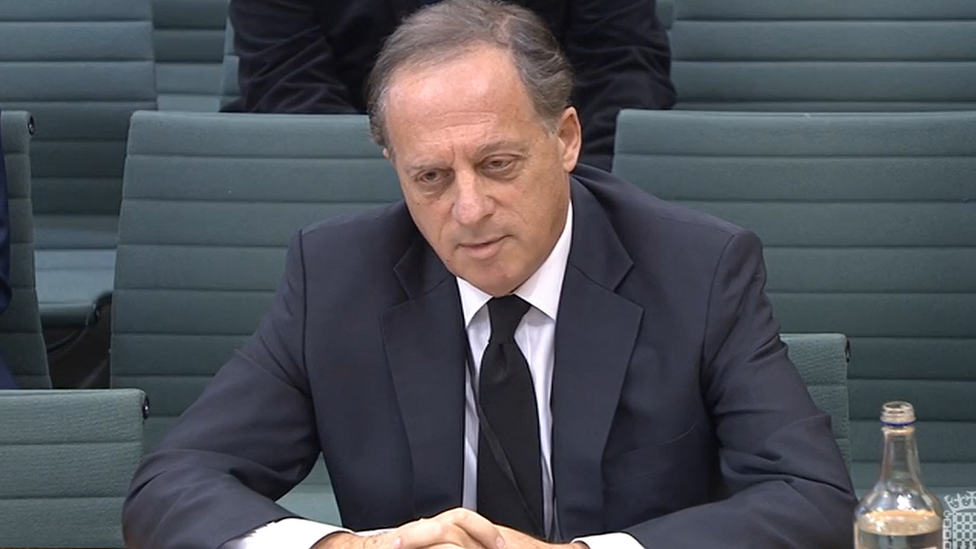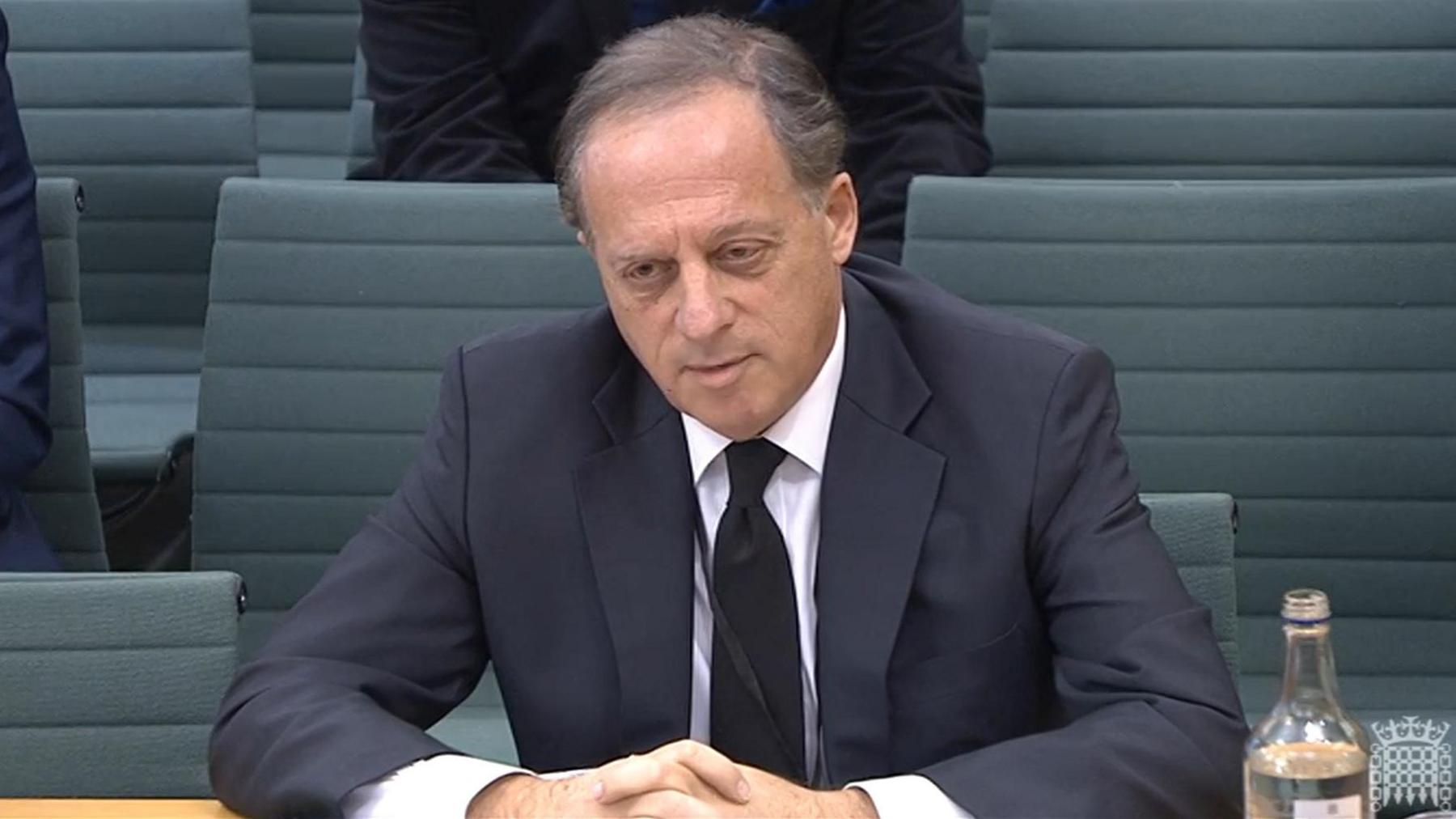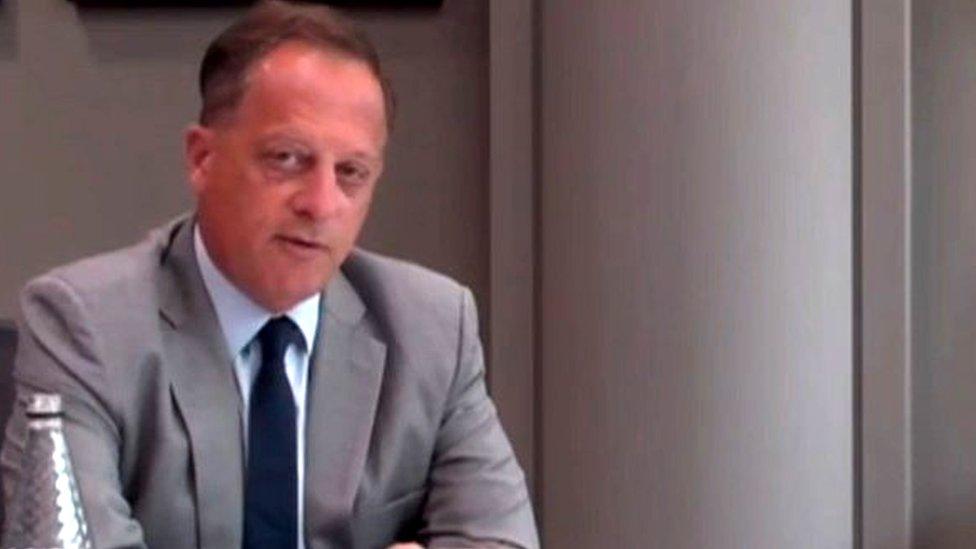Richard Sharp: BBC chairman made errors on Johnson loan, MPs say
- Published

Mr Sharp appeared before a committee of MPs on Tuesday
BBC chairman Richard Sharp made "significant errors of judgement" in acting as a go-between on a loan for Boris Johnson while he was applying for the post, MPs have said.
A cross-party committee said he had not given them the "full facts" two years ago when they were considering his suitability for the BBC role.
He should consider how this affected trust in him and the BBC, it said.
Mr Sharp apologised if MPs felt they had not had the details they needed.
His involvement in the then-Prime Minister Mr Johnson obtaining an £800,000 loan guarantee has come under scrutiny since the Sunday Times first reported the claims last month., external
Businessman Sam Blyth, a distant cousin of Mr Johnson and Mr Sharp's friend, had reportedly raised the idea of acting as a loan guarantor for Mr Johnson in 2020.
When he appeared before MPs on the Commons Digital, Culture, Media and Sport (DCMS) Committee this week, Mr Sharp said he did not help arrange this guarantee or give Mr Johnson financial advice.
He was named as the government's preferred candidate for the BBC chairmanship in January 2021 and at the time the DCMS Committee backed his appointment.
The government's choice is ultimately decided by the prime minister, on the advice of the culture secretary, who is in turn advised by a panel.
In its report published on Sunday, the DCMS Committee is highly critical of Mr Sharp's failure to mention any involvement he had in events surrounding the loan when they were considering his suitability for the job.
The report said his decisions to "become involved in the facilitation of a loan to the then-prime minister while at the same time applying for a job that was in that same person's gift" and failure to disclose this to the committee undermined confidence in the public appointments process.
Earlier this week Mr Sharp had told the committee , externalhe had met Cabinet Secretary Simon Case in December 2020 to get permission to pass on Mr Blyth's details to him.
However, at the same meeting he had told Mr Case that he had applied for the BBC job, and therefore agreed he would have "no further participation" in order to avoid any conflict of interest or perception of conflict given his application to the BBC.
In its highly critical report, MPs said Mr Sharp had recognised the need to be "open and transparent" by bringing it to the attention of the cabinet secretary, but "failed to apply the same standards of openness and candour in his decision not to divulge this information during the interview process or to this committee during the pre-appointment hearing [for the BBC job]".
"Mr Sharp's failure to disclose his actions to the panel and the committee, although he believed this to be completely proper, constitute a breach of the standards expected of individuals applying for such public appointments," the report added.
The report concluded: "Mr Sharp should consider the impact his omissions will have on trust in him, the BBC and the public appointments process."
A spokesperson for Mr Sharp said he did not facilitate an introduction between Mr Johnson and Mr Blyth and he was not involved in the arrangement of a loan between them.
"Mr Sharp appreciates that there was information that the committee felt that it should have been made aware of in his pre-appointment hearing. He regrets this and apologises.
"It was in seeking at the time to ensure that the rules were followed, and in the belief that this had been achieved, that Mr Sharp acted in good faith in the way he did."
The spokesperson added: "Mr Sharp believed he had dealt with the issue by proactively briefing the cabinet secretary that he was applying for the role of BBC chair, and therefore beyond connecting Mr Blyth with Mr Case, he recused himself from the matter."
The DCMS Committee report was also critical of ministers who had defended the decision to endorse Mr Sharp in 2021 after the row over the loan broke, despite the fact they had not been told about the situation.
"The fact that ministers have cited this committee's original report on Mr Sharp's appointment as a defence of the process was followed, when we were not in full possession of all the facts that we should have had before us in order to come to our judgement, is highly unsatisfactory," the report said.
Prime Minister Rishi Sunak has said Mr Sharp was made BBC chairman following two "transparent and rigorous" appointment processes, adding the appointment was made by his predecessor.
According to the Sunday Times, a leaked memo from Mr Case allegedly warned Mr Johnson to "no longer" ask for financial advice from Mr Sharp.
But the MPs in this new report said there was an "unresolved issue" as to why the cabinet secretary had believed Mr Sharp had been giving financial advice to Mr Johnson and called on the Cabinet Office to "clear up the confusion relating to the advice given to the prime minister immediately", given that Mr Sharp had said this was not the case.
Acting Chair of the DCMS Committee Damian Green MP said: "The public appointments process can only work effectively if everyone is open and transparent, yet Richard Sharp chose not to tell either the appointment panel or our committee about his involvement in the facilitation of a loan to Boris Johnson."
A Cabinet Office spokesperson said: "We do not comment on leaks."


For those of us following this story in detail, a fascinating element is the memo written by the Cabinet Office to Boris Johnson on 22 December 2020.
Mr Sharp is about to be announced as BBC chairman, a role appointed by the then-prime minister. So Boris Johnson is told he must "no longer ask him advice about your personal financial matters".
Mr Sharp says he never gave Mr Johnson advice about his finances. So why is the memo phrased in that way? The committee has called upon the Cabinet Office to clear up the confusion immediately.
The committee doesn't call for him to resign, but it does come close to suggesting Mr Sharp considers his position when it says he should consider the impact his actions have had on trust in him and the BBC.
It is not at all certain that, even if he had declared this potential conflict of interest, somebody else would have been chosen as BBC chairman.
The process, though, is under scrutiny and we now await the investigation by the public appointments watchdog.

Shadow culture secretary Lucy Powell said the BBC chairman's position was becoming "increasingly untenable" and it "throws into serious doubt the impartiality and independence that is so fundamental to trust in the BBC."
The Liberal Democrats said Mr Johnson also needed to answer questions as part of an independent inquiry.
The watchdog that oversees how public appointments are made is also reviewing the process of how Mr Sharp was hired.
William Shawcross, the Commissioner for Public Appointments, recused himself from heading up that review last month after writing to the DCMS to say he had met Mr Sharp on "previous occasions".
The BBC is also conducting its own internal review over any potential conflicts of interest Mr Sharp may have in his role as BBC chairman.
Foreign Office minister Andrew Mitchell told the BBC's Sunday with Laura Kuenssberg programme it was important to wait for the watchdog's report.
"We need to be fair to all parties in this, including Richard Sharp," he said.
Mr Mitchell added: "The BBC is not a silent part of all of this, the board of the BBC will need to consider what he's said and reach their own conclusions. I think the government will react appropriately to that."
Related topics
- Published7 February 2023

- Published23 January 2023
